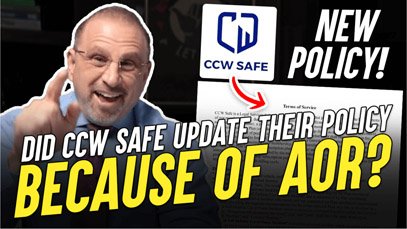Updated USCCA Policy Review (2024): Are These Updates Really an Improvement?
June 14, 2024
Criminal defense attorneys Marc J. Victor and Andrew C. Marcantel review the United States Concealed Carry Association (USCCA) contract update, which became effective June 5, 2024. The attorneys also review a June 2024 email from USCCA’s CEO, Tim Schmidt, the USCCA membership agreement, and the insurance policy issued by Universal Fire and Casualty Insurance Company.
“The goal of this video is to go through the updates that USCCA has made to their contract and cheer them on for the good stuff and point out things that we don’t think are so great and then let people decide for themselves.”
– Attorney Victor
Positive Additions in the New Policy
USCCA’s updated policy introduces new coverage features. One is coverage of up to $15,000 for “red flag law” proceedings, where firearms can be removed without the gun owner’s presence in court. Bond coverage was also expanded, now offering up to $250,000 for cash-only bonds and up to $2.5 million for secured bonds.
Additionally, up to $5,000 is available for expungement or sealing of records where legally permitted. The updated policy also provides up to $10,000 for lost wages derived from a self-defense incident.
Contractual Concerns
Despite these improvements, the attorneys raise concerns about several vague or unclear provisions. USCCA reserves the right to terminate any member whose behavior it deems “contrary to the interests of the USCCA,” including retroactive termination for fraud, bad faith, or criminal intent. The attorneys criticize the lack of clear standards and due process protections. Similarly, the contract permits USCCA to change its terms at any time without notice, only requiring that changes be posted on their website.
“The language is squishy enough that it seems to say . . . if we determine that your intent was criminal at any time during the incident, then we have the right to retroactively terminate you, but don’t worry, we’re not going to give you a lawyer, we’ll give you your money back.”
– Attorney Marcantel
Further confusion surrounds the contradictions between USCCA’s marketing and the actual contract. Marketing language assures guaranteed coverage if the member can claim self-defense in good faith. However, the insurer retains full discretion to accept or deny claims after investigation.
Emergency Contact Procedures and Attorney Privilege
The attorneys raise concerns about post-incident procedures. After a self-defense incident, members are instructed to contact USCCA’s Critical Response Team (CRT), which includes individuals who are not attorneys. As a result, conversations with CRT personnel are not protected by attorney-client privilege and may be subpoenaed, posing risks to an adequate legal defense. Additionally, members must submit a detailed written report within ten days to initiate coverage. This is an impractical requirement, especially if a member is incarcerated or uncertain about the date of the deadline to file the report.
“That’s the person you’re going to talk to and tell them what happened? This is all discoverable and we found this out in the Alan Colie case.”
– Attorney Victor
Attorney Selection and Conflicts of Interest
While USCCA advertises member choice in legal representation, the insurer ultimately has the authority to assign or reject defense counsel. Member-selected attorneys must agree to the insurer’s billing rates and reporting guidelines, details of which are not publicly disclosed. The attorneys note that these requirements can create ethical conflicts and interfere with defense strategies, particularly if attorneys must report confidential case details to the insurer.
“They have the sole discretion to do that, right? They get to assign the attorney they choose, but okay, they won’t unreasonably withhold, so long as the lawyer agrees to the billing rates.”
– Attorney Victor
Exclusions and Coverage Limits
The policy broadly excludes coverage for criminal acts and references 18 U.S.C. § 922, a federal statute with numerous violations that could disqualify members from coverage.
“What if you’re using alcohol? What if the incident arises out of domestic violence? What if it’s imperfect self-defense, you tried your best but you blew it? What if you had a negligent discharge? . . . I don’t know and I can’t tell from reading this insurance contract whether or not any of that is also excluded.”
– Attorney Victor
Legal protection only applies to objectively reasonable actions related to self-defense incidents. Thus, it does not cover actions determined only to be subjectively reasonable, such as an individual acting in “imperfect self-defense.”
Though there is now some coverage for plea agreements, any guilty plea to a “crime of violence” is excluded. The definition used encompasses nearly all offenses involving force or bodily injury. As a result, members who enter plea agreements in these incidents lose coverage. This includes sentencing hearings and post-conviction appeals. The attorneys express concern that this structure may push attorneys to avoid plea deals that could benefit clients, simply to preserve insurance coverage.
Recoupment and Legal Settlements
The policy contains a recoupment clause allowing the insurer to recover legal fees if the applicable law prohibits coverage. However, the contract fails to specify which states this applies to, creating uncertainty for members.
“I would have liked it if they would have at least listed the states that they’re concerned about that may require them to enforce this recoupment provision, but the contract seems to be silent about that.”
– Attorney Marcantel
Significantly, the insurer has the exclusive right to settle civil lawsuits without member approval. This undermines client autonomy and can affect a member’s criminal defense, especially if civil settlement terms involve admission of wrongdoing.
Members also face restrictions on suing the insurer. Legal action against the company is only permitted if the member has fully complied with all contract terms, limiting their legal remedies even in cases of bad faith or error by the insurer.
The Kayla Giles Case
The attorneys discuss the case of Kayla Giles, a former USCCA member involved in a self-defense incident. Despite her claim being supported by her attorney, the insurer canceled her coverage before trial. The attorneys question USCCA’s refusal to apply its new, more comprehensive policy retroactively or to revisit its prior actions in Ms. Giles’ case.
Conclusion
The attorneys acknowledge that while USCCA’s updated policy contains some meaningful improvements, many aspects of the policy remain unclear. The attorneys recommend reading the full insurance contract carefully, understanding the limits of coverage, and consulting with independent legal counsel before relying on USCCA membership for self-defense protection.
The Attorneys On Retainer Program provides full transparency of our contract and fees. If you want to learn more about our AOR Program and what it can do for you, please call 866-404-5112 or email us.



